

'Lost generation of unemployed': Covid hits careers of over-50s. Lisa Griffiths, a 61-year-old special needs nanny, has spent her career easily moving from one contract to the next.
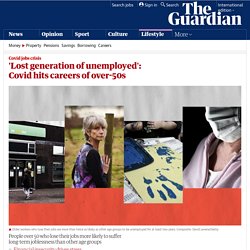
So when her last, five-year contract ended recently, she was shocked to find new employment opportunities far more limited than she had expected. Then, while she was considering her options, the pandemic hit and work dried up altogether. “It’s been a real shock for me, and my fear is that if this enforced unemployment is not only to do with the pandemic but my age as well – I have no evidence that it is ageism but I have a strong feeling that it is – then things are going to get worse and not better,” she said. “If I retire earlier than the state pension age and then my husband loses his job, it would be a catastrophe,” she added. “I know there are things like universal credit but we’ve never had to lean on government support before and I’m not sure that my husband would even entertain the idea.” The Future of Work in Developing Economies. References (6) 1.
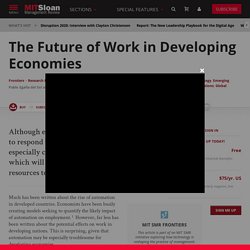
See, for instance, C.B. Frey and M.A. Careers of the Future: 42 Professions of Tomorrow - The Startup - Medium. GuidetoFutureWork. The four futures of work: preparing for good work, come what may. This article is an extract from the RSA report ‘The Four Futures of Work: coping with uncertainties in the age of radical technologies’ In a new report from the RSA Future Work Centre we outline the results of our own exercise in scenario planning with leading engineers Arup, detailing four very different scenarios for the future of work in the UK: The Big Tech Economy describes a world where most technologies develop at a rapid pace, from self-driving cars to 3D printing…
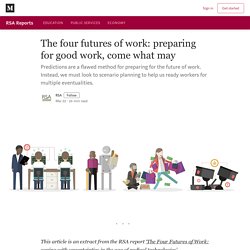
The Future of Work in Africa : Harnessing the Potential of Digital Technologies for All. Our Misplaced Fear of Job-Stealing Robots. AI Will Create Millions More Jobs Than It Will Destroy. Here's How. Here Are the Jobs of the Future That Robots Won’t Be Able to Fill – Futurism. Which digital skills do you really need? Skill shift: Automation and the future of the workforce. Demand for technological, social and emotional, and higher cognitive skills will rise by 2030.
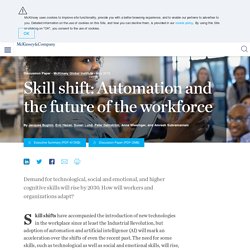
How will workers and organizations adapt? Skill shifts have accompanied the introduction of new technologies in the workplace since at least the Industrial Revolution, but adoption of automation and artificial intelligence (AI) will mark an acceleration over the shifts of even the recent past. The need for some skills, such as technological as well as social and emotional skills, will rise, even as the demand for others, including physical and manual skills, will fall. These changes will require workers everywhere to deepen their existing skill sets or acquire new ones. Companies, too, will need to rethink how work is organized within their organizations. Gig Economy Data and Stats: A Summary of Every Freelance Survey. AI, radiology and the future of work - Images aren’t everything. A study finds nearly half of jobs are vulnerable to automation.
Retraining and reskilling workers in the age of automation. Executives increasingly see investing in retraining and “upskilling” existing workers as an urgent business priority that companies, not governments, must lead on.
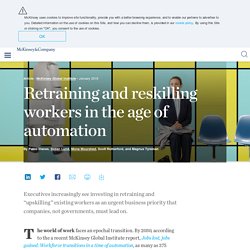
The world of work faces an epochal transition. By 2030, according to the a recent McKinsey Global Institute report, Jobs lost, jobs gained: Workforce transitions in a time of automation, as many as 375 million workers—or roughly 14 percent of the global workforce—may need to switch occupational categories as digitization, automation, and advances in artificial intelligence disrupt the world of work.
The kinds of skills companies require will shift, with profound implications for the career paths individuals will need to pursue. How big is that challenge? In terms of magnitude, it’s akin to coping with the large-scale shift from agricultural work to manufacturing that occurred in the early 20th century in North America and Europe, and more recently in China. What are the main barriers? Good questions all. Artists envisioned the future of work, and the results are pure fantasy.
Jobs are shifting.
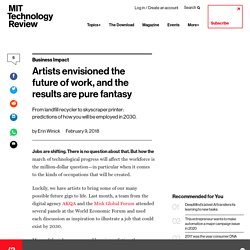
There is no question about that. But how the march of technological progress will affect the workforce is the million-dollar question—in particular when it comes to the kinds of occupations that will be created. Luckily, we have artists to bring some of our many possible future gigs to life. Last month, a team from the digital agency AKQA and the Misk Global Forum attended several panels at the World Economic Forum and used each discussion as inspiration to illustrate a job that could exist by 2030.
Many of the jobs seem more like science fiction than reality, but a few are actually pretty grounded in where technology seems to be headed. What Will Work Look Like in 2030? Imagine a world in which the human resources function as we know it vanishes and is replaced by automation, outsourcing, and self-organizing teams.
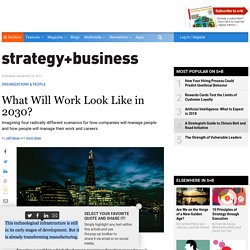
Or a world in which top talent is fought over so fiercely that the most adept tech workers hire agents to negotiate and manage their careers. It may sound like science fiction. Getting ready for the future of work. Artificial intelligence is poised to disrupt the workplace.
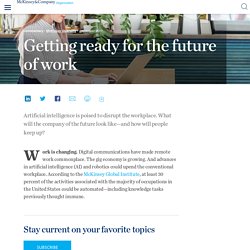
What will the company of the future look like—and how will people keep up? Work is changing. Digital communications have made remote work commonplace. The gig economy is growing. Tech. What the future of work will mean for jobs, skills, and wages. In an era marked by rapid advances in automation and artificial intelligence, new research assesses the jobs lost and jobs gained under different scenarios through 2030.
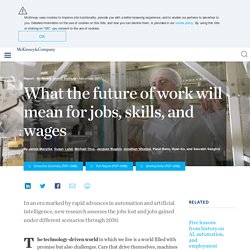
The technology-driven world in which we live is a world filled with promise but also challenges. Cars that drive themselves, machines that read X-rays, and algorithms that respond to customer-service inquiries are all manifestations of powerful new forms of automation. Yet even as these technologies increase productivity and improve our lives, their use will substitute for some work activities humans currently perform—a development that has sparked much public concern. Video Powerful new technologies are increasing productivity, improving lives, and reshaping our world.
The results reveal a rich mosaic of potential shifts in occupations in the years ahead, with important implications for workforce skills and wages. 1. 2. Rising incomes and consumption, especially in emerging economies Aging populations 3. Untitled. Economist. The Cozy, Overcrowded, Keg-Filled Future of Work - The Atlantic. The United Nations projects that, by the year 2030, roughly 1 billion more people will be living in cities than do now.
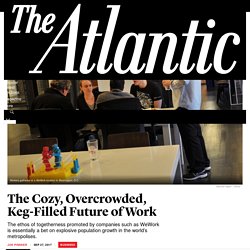
As of last year there were 31 cities with more than 10 million residents, and in about a decade, there will be 41. These demographic trends are a source of fascination for urban planners and theorists around the world. Those who study what these shifts will mean view the coming era of urban mega-density with both excitement and fear. Others, however, see a clear business opportunity. Navigating through new forms of work. From the individual 9-to-5 workday to how entire industries function, work is changing faster than ever.
Big shifts threaten to create massive societal and economic disruption unless we look seriously at making the future of work productive and rewarding for everyone. “The future is already here” What images does “the future of work” conjure up for you? In his 1930 essay, Economic possibilities for our grandchildren, John Maynard Keynes foretold a future of “technological unemployment” and 15-hour workweeks.1 We’ve long since given up on early 20th-century utopian visions of a leisure society in which machines do almost everything for us. But there’s no question that what we actually do these days is changing fast, and will continue to change. Jobs of the future - Chris Skinner's blog. There are lots of reports of robots taking jobs from humans, and our fear for the future world of no work.
One paper from researchers at Oxford University predicts that 47% of American jobs are at “high risk” of computerisation over the next two decades. Another research report issued in 2015 by McKinsey Global Institute found that 45% of work activities could be automated, including 20% of the responsibilities handled by the world’s obscenely compensated CEOs, such as analysing operations data. Another paper from economists at Boston and Columbia University finds that “smart machines” will cause a “long-run decline in labour share of income,” cause more technology boom-busts and a “growing dependency of current output on past software investment.” In other words, there will be less need for new code and therefore less employment even for coders. He was missing my favourite one, which is Chief Cannibal Officer.
So which jobs will be lost to automation first? Future of work report: Foundation for Young Australians predicts 2030 workplace. Play Video Caption Settings Dialog. 7 Critical Skills For the Jobs of the Future. We live in a world of accelerating change. New industries are constantly being born and old ones are becoming obsolete. A report by the World Economic Forum reveals that almost 65 percent of the jobs elementary school students will be doing in the future do not even exist yet. Both the workforce and our knowledge base are rapidly evolving. Combined with the effects of technological automation on the workforce, this leaves us with a crucial question: What are the skills future generations will need? Education expert Tony Wagner has spent a lifetime trying to answer this very question. 1. We spend so much time teaching students how to answer questions that we often neglect to teach them how to ask them. Wagner notes the workforce today is organized very differently than it was a few years ago.
The Human Face of High Value Work – Andrew Curry – Medium. This is a version of a talk I gave in Helsinki at Teknologia ‘15, based on the work on High Value Work that we have have done at The Futures Company with the Association of Finnish Work. The Futures Company has been collaborating with the Association of Finnish Work for more than eighteen months on the idea of “High Value Work”. We define this as work that is productive (it creates new value); that is durable (it creates value over time); and work that is inclusive (it spreads value beyond the business — or the C-suite.
This combination, based on the emerging post-crisis literature, also creates work that is meaningful, for employees and customers. In the first of our four reports on High Value Work, we identified four routes to it. High value businesses combine these; for example, mastery of resource innovation often creates new technical capabilities that lead to new forms of rich knowledge. Human capabilities High value companies People drive value Better employee relationships.
The High Value Work Agenda - Kantar Futures. The future of work – Andrew Curry – Medium. Shift. DocSend. The 10 Most Important Work Skills in 2020 – Top Ten Online Colleges. Share this infographic on your site! <a href=" src=" alt="Important Work Skills for 2020" width="500" border="0" /></a><br />Source: <a href=" Technology, jobs, and the future of work. Automation, digital platforms, and other innovations are changing the fundamental nature of work. Understanding these shifts can help policy makers, business leaders, and workers move forward. Digital transformation about to face business reality vs investment tug of war. Digital transformation isn't cheap and old-line enterprises are about to struggle to balance current results and future investments and swap out executives. What a load of COBOLx - Chris Skinner's blog. I was inspired to think more about the legacy challenge in the legacy economies when I saw this article by the inimitable Anna Irrera (she’s worth following if you’re on twitter).
The future of work – Andrew Curry – Medium.